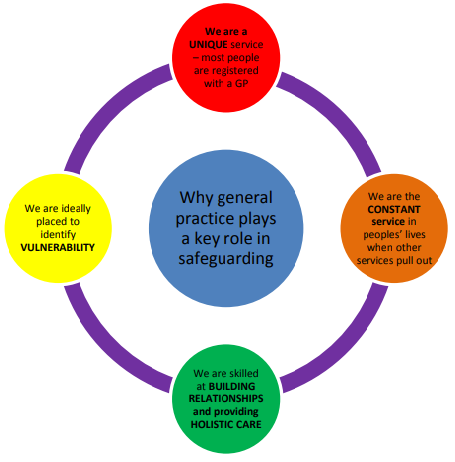Adult safeguarding toolkit
The Safeguarding Adults at Risk of Harm toolkit provides info sheets, templates, and handy guides for all the primary care team.
We are awaiting a review before updating this resource. Please use with caution.
Like most areas of healthcare, general practice is rapidly evolving and under immense pressure. Despite this, general practice continues to strive to give excellent holistic care to our patients.
Safeguarding is simply part of the holistic care we already give to our patients.
There are a number of unique factors about general practice that make us ideally placed to play a key role in safeguarding our patients:

Isn't it just the responsibility of GPs in a practice to be involved in safeguarding?
It is not only GPs who play a key role in safeguarding in general practice, it is the whole practice team. Examples of this could be:
- The receptionist, who enables the homeless person with no documentation or ID to register at the practice
- The administrative team, who spend time ensuring that Child and Adult Safeguarding Conferences are in the rota to enable a GP to attend
- The coder who, on summarising a new patient record, identifies that someone with learning disabilities is living in a household where there is domestic abuse and brings this to the attention of the Practice Safeguarding Lead
- The practice nurse, who makes a phone call to the elderly person with dementia who has not attended for their Vitamin B12 injection and gains consent to discuss with a family member to ensure the patient can be supported in attending future appointments
- The practice manager, who ensures all staff are safely recruited and who acts swiftly when an allegation is made that a member of staff is a potential perpetrator of abuse
Every team member plays an important and crucial role in safeguarding patients.
What attributes are needed for effective safeguarding in general practice?
Good communication is the most important and effective tool in safeguarding. Safeguarding is often likened to a jigsaw puzzle with individuals and agencies holding a different part of the puzzle.
To see the big picture, good communication is essential:
- With patients and their families/friends/carers as appropriate
- With other members of the general practice team
- With members of other community healthcare teams such as secondary care, district nurses, memory clinics, learning disability teams
- With adult social care
- With the wider safeguarding team such as CCG Named GPs and Designated Professionals
- With other agencies as necessary such as the police, domestic abuse agencies
Good practice idea – Get to know your local Safeguarding professionals – invite them to your practice meetings to find out what they do, how they work and so they can hear from you too.
Other attributes key to safeguarding:
- Humility: Recognise that none of us know it all and we as professionals cannot, and should not, have all the answers or impose our own thoughts and beliefs. We must listen to, work with and empower those who are vulnerable.
- Compassion: Recognise that for many of our vulnerable patients and families, life is, and has been, very difficult. Many have experienced repeated traumatic experiences. We are not there to judge, but to support.
- Wisdom: Recognise that sometimes we have to make difficult decisions in the best interests of a child or vulnerable adult. This wisdom comes from listening to those who are vulnerable, liaising with other professionals/agencies and being able to work together in the best interests of the vulnerable patients we serve.